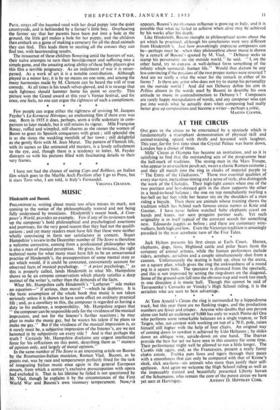MUSIC .
Hindemith and Busoni.
PHILOSOPHICAL writing about music too often misses its mark, not coming to the notice of the philosophically trained and not being fully understood by musicians. Hindemith's recent book, A Com- poser's World, provides an example. Few if any of its reviewers took up the composer's bold philosophical and psychological assertions and premisses, for the very good reason that they had not the qualifi- cations; and yet many readers must have felt that these were neither wholly convincing in form nor satisfactory in content. Stuart Hampshire's review in the December number of The Score is therefore a welcome corrective, coming from a professional philosopher who is also a man of musical perception. He gives, for instance, the right technical name for what many must have felt to be an unwarranted practice of Hindemith 's, the presupposition of some mental state or act which would, if it could be constated, conveniently account for observed facts of musical psychology. " A priori psychology," as this is properly called, lands Hindemith in what Mr. Hampshire shows to be an extreme conservatism which plainly satisfies a deep instinct of the writer's, rather than the demands of the facts.
What Mr. Hampshire calls Hindemith 's "Lutheran" side makes an equation—" if serious, then moral "—which he deplores. It is . the basic assumption of the whole book that music is not taken seriously unless it is shown to have some effect on ordinary practical life ; and, as a corollary to this, the composer is regarded as having a duty to his audience, a responsibility. Mr. Hampshire argues that "the composer can be responsible only for the vividness of the musical impression, and not for the listener's further reactions ; he may plan to make the music gay, but he wastes his talent if he plans to make me gay." But if the vividness of the musical impression is, as it surely must be, a subjective impression of the listener's, are we not hemmed in by subjectivity on every side ? And is that perhaps the truth ? Certainly Mr. Hampshire disclaims any cogent intellectual force. for his reflections on this point, describing them as " matters of opinion only, and largely of moral opinion." In the same number of The Score is an interesting article on Busoni by the Roumanian-Italian musician, Roman Vlad. BUS013i, as he points out, was by race and temperament perfectly fitted for the task of integrating Italian music once again in the general European stream, from which a century's exclusive preoccupation with opera had excluded it. That in his lifetime he failed is not questioned by M. Vlad, though he explains it by the circumstances of the First World War and ,Busoni!s own visionary temperament. Now,- it appears, Busoni's po..ihiiinous influence is growing in Italy, and it is possible that what h.: filed to achieve when alive may be achieved by his works after his death.
Like Hindemith, Busoni thought in philosophical twits about the art which he practised, although his conclusions were very different from Hindemith 's. Just how provokingly imprecise composers can be—perhaps must be—when they philosophise about music is shown by a remark of Busoni's quoted by M. Vlad. " Debussy seeks to stamp his personality on the outside world," he said. "I, on the other hand, try to express in well-defined form something of the infinity which surround; human life." Would that dictum be any less convincing if the pos.tioli of the two proper names were reversed ? And are we really a whit the wiser for the remark in either of its forms ? Is there any artist who does not try to stamp his personality on the outside world ? And did not Debussy define his aim in Pe/leas almost in the words used by Busoni to describe his own attitude to music in contradistinction to Debussy's ? Composers are rarely happy manipulators of words, and any composer who can put into words what he actually does when composing had really better give up composition and become a writer—perhaps a critic.
MARTIN COOPER.






























 Previous page
Previous page